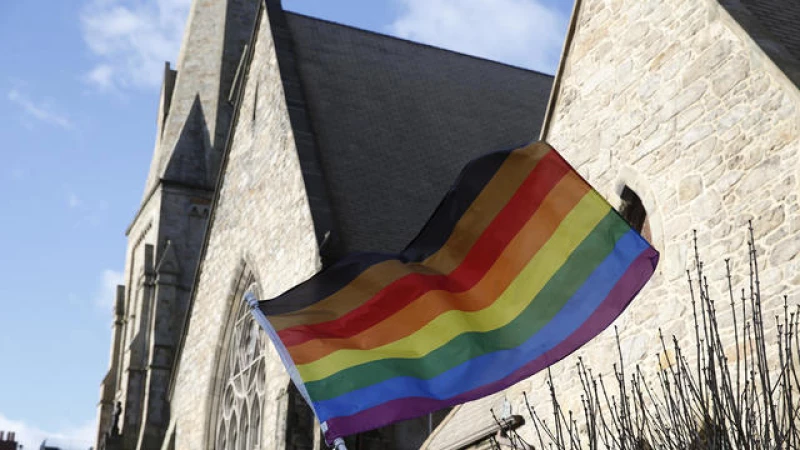Amidst the bustling city of Charlotte, North Carolina, thousands of United Methodists have convened for their grand denominational gathering, famously known as General Conference.
This highly anticipated event, typically scheduled every four years, was postponed from 2020 due to the impact of the COVID-19 pandemic.
Spanning from April 23 to May 3, this year's 11-day conference sees the congregation of numerous voting delegates. These delegates, elected from United Methodists worldwide to represent their respective regional church bodies, are pivotal decision-makers at the General Conference. However, it's worth noting that up to a quarter of international delegates may not be able to attend.
The Significance of the General Conference
General Conference serves as the sole authoritative body for the entire denomination. It functions as a business assembly where delegates establish policies, approve budgets, and address overarching church matters. This conference holds the exclusive authority to modify the United Methodist Book of Discipline, encompassing church laws and Social Principles, which are statements on social and ethical matters. Additionally, the event incorporates moments of worship and communal bonding.
This will be the first General Conference since more than 7,600 mostly conservative congregations left the United Methodist Church between 2019 and 2023 because the denomination essentially stopped enforcing its bans on same-sex marriage and having "self-avowed practicing homosexuals" serving as clergy and bishops.
The delegates in Charlotte are expected to vote on whether to eliminate the LGBTQ-related bans this year. Similar efforts have failed in years past, but with the election of more progressive delegates and the departure of many conservatives, supporters of removing the bans are optimistic.
What other key issues are up for consideration?
— Disaffiliations: The rules that allowed U.S. congregations to leave between 2019 and 2023. It allowed them to leave with their properties, held in trust for the denomination, under friendlier-than-normal legal terms. Some want similar conditions for international churches and for U.S. churches that missed the 2023 deadline.
— Regionalization: A proposal to restructure the denomination into regional conferences around the world, rather than having distinct names for U.S. and other jurisdictions. It would define the role of regions more precisely and put American congregations into their own regional body. Under this proposal, all regions would be able to adapt church policies to their local contexts, including those on marriage and ordination.
— Budgets: Because of all the disaffiliations, the conference will vote on a much-reduced budget proposal for the coming years.
"Revitalizing the United Methodist Church"
During the opening worship of the General Conference, New York Area Bishop Thomas Bickerton, the president of the denomination's Council of Bishops, delivered a passionate address addressing the recent schism. He shared his experience visiting a Texas conference that had lost more than half of its churches, emphasizing the commitment of those remaining to rebuild the church. Bickerton urged attendees to focus on revitalization rather than perpetuating controversy.
Amidst applause, Bickerton posed the questions, "Are you committed to the revitalization of the United Methodist Church? Are you here to work for a culture marked by compassion, courage, and companionship?" He challenged those who couldn't align with these goals to reconsider their presence at the conference.
Responding to criticism during the disaffiliation debates, Bickerton defended the denomination's core beliefs, stating, "Don't you tell us that we don't believe in Scripture. Don't you tell us that we don't believe in the doctrine of the church. And Lord have mercy, don't tell us that we don't believe in the resurrection of Jesus Christ. We have got to rebuild the church and we've got to do it together."
While the General Conference is expected to draw thousands of Methodists, the official voting delegates are limited to 862 individuals, with 55.9% from the U.S. and 32% from Africa.
• 6% from the Philippines
• 4.6% from Europe
• 1.5% from concordant (affiliated) churches
How are congregations preparing?
That varies widely, but those long active in the movement to repeal LGBTQ bans are focused strongly on the conference. First United Methodist Church in Pittsburgh, for example, held a commissioning service on April 14 for three members attending the conference in varying capacities. "It will be deeply meaningful for me personally to vote for those changes," said member Tracy Merrick, who will be a delegate.
United Methodists belong to a larger global network of Methodists and similar groups following the teachings of 18th-century British Protestant leader John Wesley. Their focus on evangelism, righteous living, and community service aligns them with many Christian beliefs, though they maintain some unique doctrines. Spanning from liberal to conservative, United Methodists were recently the third largest and most geographically widespread denomination in the United States. Methodist missionaries established churches worldwide, particularly in Africa, where significant growth occurred. While some churches gained independence, others across four continents remain affiliated with the United Methodist Church.
An estimated 5.4 million United Methodists resided in the U.S. in 2022, but this number is expected to decline significantly following disaffiliations in 2023.







